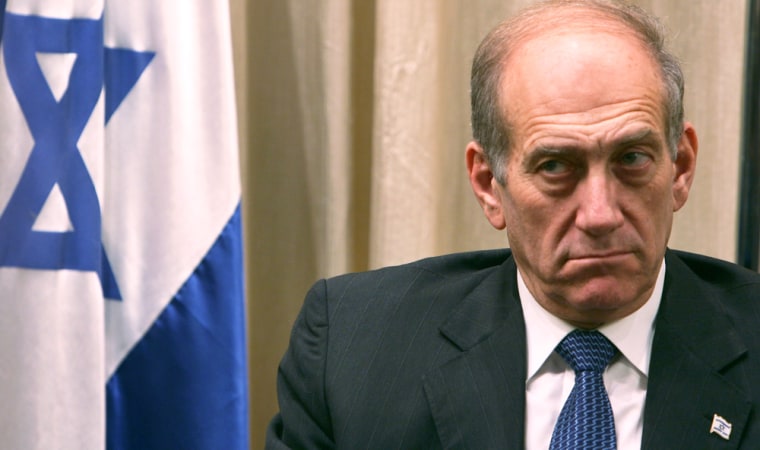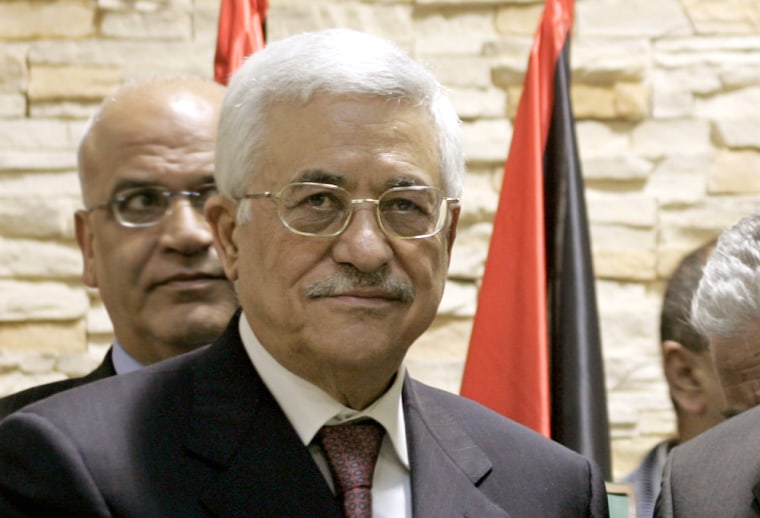Al-Qaida has spread to the West Bank and Gaza Strip and its operations there could have dire consequences for the entire region, Palestinian leader Mahmoud Abbas said in an interview published Thursday. Israel said it was stepping up its campaign against the terror network.
South Africa, meanwhile, confirmed it had invited the leaders of Hamas for talks as the militant group prepares to take over the Palestinian parliament, yet another blow to Israel’s efforts to isolate the militant group. No timetable has been set for the visit, Hamas spokesman Sami Abu Zuhri told The Associated Press.
Abbas said Palestinian security forces have not captured any al-Qaida operatives but had evidence they were in the territories.
“We have signs of an al-Qaida presence in the West Bank and Gaza,” Abbas told the London-based Al Hayat newspaper, without elaborating. “The infiltration of al-Qaida can ruin the whole region.”
Abbas: Al-Qaida sending operatives
He elaborated during a later news conference on the Jordan-West Bank border, saying: “We have information, yet to be confirmed, that al-Qaida, just as it sends its operatives to Jordan and other countries like Saudi Arabia and others, also might send us operatives for sabotage (acts).
“We must be alert, and all our security forces are trying with all means to prevent their arrival here, or their carrying out any sabotage acts in this region.”
Israel has warned before that al-Qaida was operating in Gaza and recently arrested a Palestinian it said worked for the group. Jordan’s King Abdullah also has said al-Qaida has set up terror cells in Israel.
Osama bin Laden repeatedly has identified Israel as a target, and the Palestinian cause has been cited as one of the reasons for the network’s attacks.
Asked to comment on Abbas’ remarks, acting Israeli Prime Minister Ehud Olmert said Israel was stepping up its campaign against Al-Qaida.

“There are, of course, attempts by terror elements, including international ones, to extend their reach in areas adjacent to us,” Olmert told reporters in Jerusalem.
“We are systematically intensifying our war,” he said, adding that “all restraints have been lifted on security forces where preventing and thwarting (terror) is concerned.”
In the same briefing, Olmert vowed to use an “iron fist” against Palestinian militants who have stepped up their attacks and said no restrictions would be placed on security forces.
Recent increase in attacks
Olmert spoke after a rash of shootings and stabbings claimed the life of one Israeli civilian and wounded five since Tuesday. In the latest attack, just a month before Israel’s March 28 elections, an Israeli man was stabbed in the neck at an Israeli factory in northern Jerusalem on Thursday.
Israel also expressed concern at the South African invitation to Hamas, which the Foreign Ministry in Johannesburg confirmed.
“We would be concerned that giving legitimacy to an unreformed Hamas could stifle the possibility that the movement will transform itself from a terrorist organization to a political party,” Israeli Foreign Ministry spokesman Mark Regev said.
Hamas, which is considered a terrorist organization by the U.S. and the European Union as well, killed more than 500 Israelis in four years of suicide bombings that it suspended last year.
The group’s landslide victory in Jan. 25 Palestinian elections took the world by surprise, prompting international demands that the group recognize Israel’s right to exist, renounce terrorism and accept Mideast peacemaking.
But the international wall of solidarity began to crumble last month when Russia invited Hamas leaders to Moscow for talks, despite the group’s adherence to its violent ideology. That invitation, which was endorsed by the French, was followed by talks between Hamas and Turkish Foreign Minister Abdullah Gul and an invitation from Venezuela to visit.
Palestinian funds at stake
Similarly, Western threats to withhold hundreds of millions of dollars in aid to the Palestinians have been tempered by the prospect of deepening humanitarian distress and chaos in already impoverished Palestinian areas.
The group’s talks in Russia are set to begin on Friday. Abu Zuhri said Hamas leaders would ask for economic and political support.
The Palestinian Authority desperately needs an infusion of foreign aid, especially after Israel last month stopped the transfer of payments it owes to the Palestinian Authority, saying it feared the money could be used to finance attacks against Israel once the militants take power later this month.
Those payments — taxes and customs Israel collects on behalf of the Palestinian Authority under a long-standing agreement — total more than $600 million annually.
In recent days, Abbas has said he expects Hamas to tame its ideology once it took power. On Thursday, ahead of the Hamas visit to Russia, the Palestinian ambassador to Moscow joined the chorus.
Hamas “ties the question of recognizing Israel as a state with the necessity to end the occupation of the Palestinian territories,” Ambassador Bakir Abdel Munem, a member of Abbas’ Fatah Party, was quoted as saying by the ITAR-Tass news agency. “At the same time, I think that Hamas may revise its stance in the interests of the entire Palestinian people.”
Israelis, Palestinians at odds over crossing
Citing security concerns, Israel kept Gaza’s main cargo crossing closed Thursday, counter to expectations. The Karni passage has been closed since an explosion there Feb. 21.
Palestinians criticized the decision to keep Karni idle.
“The continued closure is causing humanitarian and economic harm to the Palestinian people, and threatening a real shortage in food supplies,” said Salim Abu Safiyeh, director-general of the Palestinian Border Authority.
Israel has offered alternatives to Karni, but the Palestinians have rejected them for fear it would give Israel an opening to turn those passages, on Israeli territory, into the de facto crossings for goods moving in and out of Gaza.
